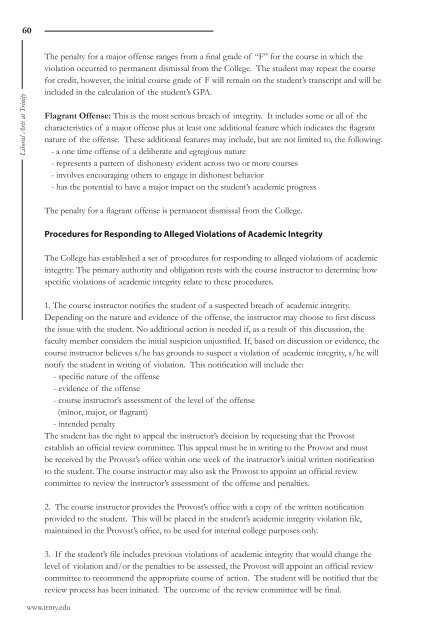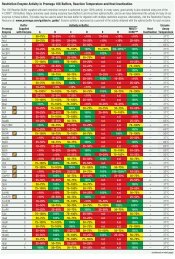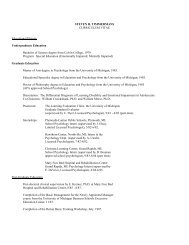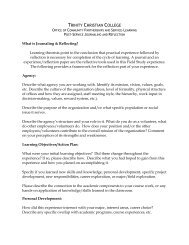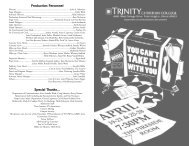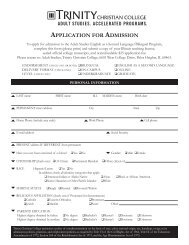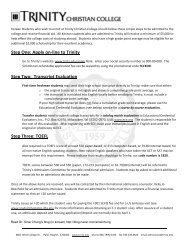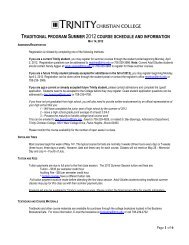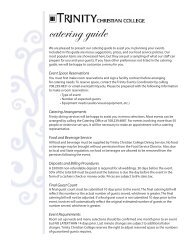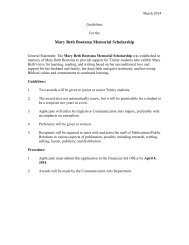College's catalog - Trinity Christian College
College's catalog - Trinity Christian College
College's catalog - Trinity Christian College
You also want an ePaper? Increase the reach of your titles
YUMPU automatically turns print PDFs into web optimized ePapers that Google loves.
60<br />
Liberal Arts at <strong>Trinity</strong><br />
The penalty for a major offense ranges from a final grade of “F” for the course in which the<br />
violation occurred to permanent dismissal from the <strong>College</strong>. The student may repeat the course<br />
for credit, however, the initial course grade of F will remain on the student’s transcript and will be<br />
included in the calculation of the student’s GPA.<br />
Flagrant Offense: This is the most serious breach of integrity. It includes some or all of the<br />
characteristics of a major offense plus at least one additional feature which indicates the flagrant<br />
nature of the offense. These additional features may include, but are not limited to, the following:<br />
- a one time offense of a deliberate and egregious nature<br />
- represents a pattern of dishonesty evident across two or more courses<br />
- involves encouraging others to engage in dishonest behavior<br />
- has the potential to have a major impact on the student’s academic progress<br />
The penalty for a flagrant offense is permanent dismissal from the <strong>College</strong>.<br />
Procedures for Responding to Alleged Violations of Academic Integrity<br />
The <strong>College</strong> has established a set of procedures for responding to alleged violations of academic<br />
integrity. The primary authority and obligation rests with the course instructor to determine how<br />
specific violations of academic integrity relate to these procedures.<br />
1. The course instructor notifies the student of a suspected breach of academic integrity.<br />
Depending on the nature and evidence of the offense, the instructor may choose to first discuss<br />
the issue with the student. No additional action is needed if, as a result of this discussion, the<br />
faculty member considers the initial suspicion unjustified. If, based on discussion or evidence, the<br />
course instructor believes s/he has grounds to suspect a violation of academic integrity, s/he will<br />
notify the student in writing of violation. This notification will include the:<br />
- specific nature of the offense<br />
- evidence of the offense<br />
- course instructor’s assessment of the level of the offense<br />
(minor, major, or flagrant)<br />
- intended penalty<br />
The student has the right to appeal the instructor’s decision by requesting that the Provost<br />
establish an official review committee. This appeal must be in writing to the Provost and must<br />
be received by the Provost’s office within one week of the instructor’s initial written notification<br />
to the student. The course instructor may also ask the Provost to appoint an official review<br />
committee to review the instructor’s assessment of the offense and penalties.<br />
2. The course instructor provides the Provost’s office with a copy of the written notification<br />
provided to the student. This will be placed in the student’s academic integrity violation file,<br />
maintained in the Provost’s office, to be used for internal college purposes only.<br />
3. If the student’s file includes previous violations of academic integrity that would change the<br />
level of violation and/or the penalties to be assessed, the Provost will appoint an official review<br />
committee to recommend the appropriate course of action. The student will be notified that the<br />
review process has been initiated. The outcome of the review committee will be final.<br />
www.trnty.edu


